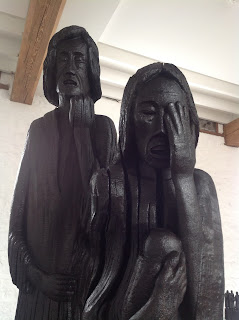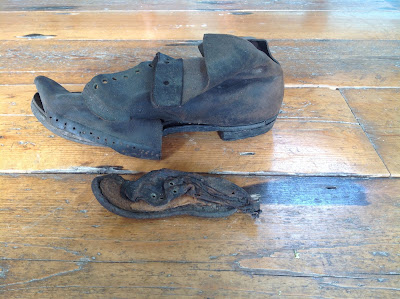Dark Shadows Exhibition
The work of Kieran Tuohy has to be seen to be
believed. Perhaps it is the fact that his large sculptures are carved from
single pieces of bog-wood, or that the
natural cracks in the petrified timber are as vital to the pieces as Kieran's
own hand, or that the striking gleam of bog-wood is just so hard to photograph.
Whatever the reason, everyone who visits the Dark Shadows Exhibition comes
away ineffably changed.
The impact
of Dark Shadows is even more incredible given the fact that the
Famine, or as many people now call it The
Great Hunger, is not new to us. It is one of the nation's most defining
events, a cataclysm drummed into us at school and reinforced by having Irish
communities around the world. It is not for love of travel alone that the Irish
Diaspora is proportionately one of the largest in the world. So to mount an
exhibition which solely focuses on The
Great Hunger would seem a risky
venture. That is, until you are confronted with the sculptures themselves.
On one of
many days spent sitting among the pieces, handling tears, frightened children
and a stream of "How could this have happened?", I realised just what
it was that made the exhibition so moving. This was not the past dragged up to
satisfy some urge to depict a trendy topic but a living, breathing, dying hoard
of starved and brutalised people. I thought of this while sitting alone in the
exhibition space and the hair raised on the back of my neck. They are actually
here, I thought to myself. All the people who died so needlessly are here in
this room, with me. It was the first time that all the facts and figures became
real. I didn't care about the hows and whys, or even who had done what. All I
could think about were my sister's two little girls and what it would be like
if they didn't have enough to eat and there was nothing that I could do about
it. The black, unblinking figures of the starving, stared at me and all I could
do was stare back, helpless. And that is why the work of Kieran Tuohy has to be
seen to be believed.
By Elizabeth Carter
By Elizabeth Carter



Comments
Post a Comment